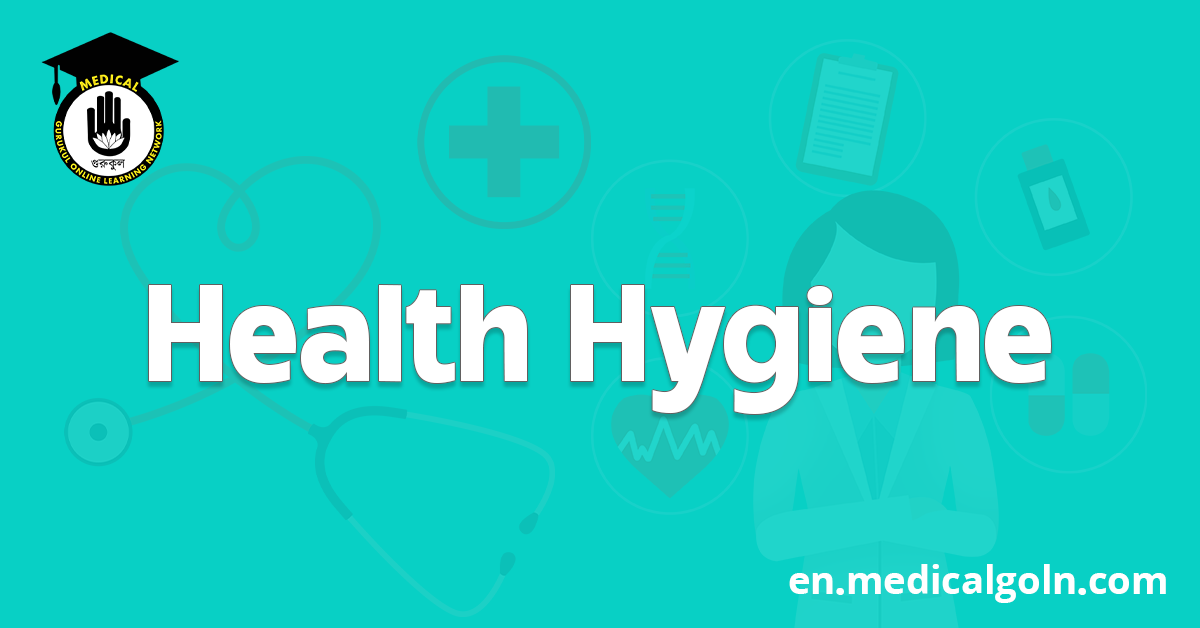Today is our topic of discussion Health Hygiene
Health Hygiene

Definition :
Hygiene is defined as “the science of health and which embraces all factors contribute to healthful living”. It has two aspects: Personal and environmental.
Aim of personal hygiene:
To promote standards of personal cleanliness within the settings of the where people live. It includes bathing, clothing, toilet use and hand washing; care of nails, feet and teeth; spitting, coughing, sneezing, personal appearance and inculcation of clean habits in the young.
Environmental hygiene
has two aspects – At domestic level and at the community.
Domestic hygiene:
It comprises that of the home, use of soap, need for fresh air, light and ventilation; hygienic storage of foods, hygienic disposal of wastes, need to avoid pests, rats, mice and insects.
Community hygiene:
Maintenance of the above principles at the community level.
Aim of environmental hygiene:
Improvement of basic saniatry services consisting of water supply, disposal of human excreta, other solid and liquid wastes, vector control, food sanitation and housing which are fundamental to health.
Personal hygiene
Definition:
‘Personal hygiene’ deals with measures which are the personal responsibilities of the individual for the promotion of good health.
Criteria and primary factors of good personal hygiene/personal factors conducive to good health/responsible factors for personal hygiene:
Health habit:
Good health habits grow by practice. It should be regular with regard to:
Eating and drinking –
One needs to develop a good eating and drinking habit. Only wholesome food should be taken and at regular intervals when there is appetite. Too much eating in one sitting should be avoided. Foods should be properly masticated and chewed. Dinner should be a light one.
Total food consumption should be in accordance with the actual need of the body. Diet should contain adequate fruits and vegetables with less fat, partcularly of animal fat.
Rest and sleep –
Rest and sleep restores one’s physical and mental capability. An adult needs about 7-8 hours of sound sleep in 24 hours. Sound sleep also helps to overcome anxiety.
Recreation –
Sometimes recreational activities or diversion from usual activities are pleasurable and essential for refreshment of mind and body such as playing, attending familial party or get-together, take a long journey with family members etc.
Care of bowels –
Constipation and it’s after-effects may put one on stress and hinders daily activities. In early stage, simply it can be corrected by taking adequate fibre-containing foods and fluids, avoiding sedentary life-style and maintaining regular bowel habit.
Smoking and drinking –
Consumption of both smoked and smokeless tobacco, and drinking alcohol produces dependency and also a risk factor for some major NCD’s. Smoking may also contribute for spread of tuberculosis.
Exercise –
It is recognized that, moderate physical activity is associated with prevention of few NCD’s, such as cardiovascular diseases, stroke, DM etc. Regular physical exercise improves collateral circulation of the tissues and enhances immunity. WHO recommended at least 30 minutes of brisk walking per day in at least 5 days a week or total 150 minutes a week.
Cleanliness –
Frequent hand washing is an important part of personal hygiene. Hand washing is especially important after toilet and before handling or eating food. The child should be trained to develop this habit.. In warm and moist climate like Bangladesh, daily bathing should be practiced. It reduces the chance of ringworm and other skin diseases.

Wearing shoes
over the soil and in toilet help to prevent transmission of ankylostomiasis and strongyloidiasis.
Pubic and axillary hair should be regularly shaved
(weekly or maximum within forty days is the Islamic rule) as because inguinoscrotal línea and axillary boil are common in our country.
Fingernails and toenails should regularly be trimmed.
Chronic paronychia and helminthic infestation are often associated with deposition of dirt underneath the nail.
Circumcision
is preventive to balanitis and balanoposthitis. Uncircumcised individuals should often retract the prepucial skin to expose the surface of glans and clear the underlying smegma.
Clothing
The dress should be both healthy and comfortable. Cotton clothing is a good conductor of body heat. The ‘borkah’ and ‘purdah’ of muslim women should be regularly washed and kept clean, otherwise it may inhabitat many organisms including M. tuberculosis. Medical students.
health professionals and personnel of other discipline who wear apron, should only wear it during their job, not in other places and should regularly clean it..
Care of hair and shaving –
Hair should regularly be cleaned and oiled. Bearded persons also same. Seborrhoic dermatitis, tinea capitis and tinea barbae are common in the community, which occurs due to lack of hygiene in hair & beard and sharing of caps, combs, brushes, bed linens, telephones, gym mats, eye-liners etc. Those who have such diseases should use anti-fungal shampoo and take extra care.
Shaving
is mostly done by professional barbers and instruments are shared usually without changing or sterilizing the sharps, leaving chance of transmission of micro-organisms.
Oral & Dental Health:
Islamic minded people uses twigs of neem tree or other similar pieces as ‘meswak’ for maintaining oral hygiene; few peoples in the rural area use toothpowder, ashes and charcoal; while people in the urban area use toothbrushes. Chewing panmasala and betel nut is a ‘social custom in our country which leaves staining along with lime stone in the tooth favouring dental caries.
After taking sweetened food, if the oral cavity is not cleaned, acid forming bacteria encouraged in the mouth, which fastens dental decay and caries.
Teeth
should be cleaned at least twice a day. After each feed, small amount of water ingestion may clean the oropharynx and oesophagus, thus may prevent candidiasis, particularly in children. Regular intake of milk, egg, fruits and vegetables helps to build a sound tooth and prevent gingivitis.
Weight Control:
Obesity is an abnormal condition in which a large surplus of fat is stored within the body. Ideal body weight should be maintained for the age and sex of the individual by the adoption of healthy life-style such as healthy diet, physical activity etc. Obesity increases susceptibility to different diseases such as, CAD, hypertension, stroke, DM, gall stone etc.
Puberty education & marital hygiene:
From early adulthood boys and girls should be taught about the importance of maintaining genital hygiene and chance of spread of diseases through sexual route. Boys and girls should be taught seperately about the initiation of sexual maturity (night emission in boys and menstruation in girls) and so necessity of extra hygienic care.
On the religious ground, boys should be adequately bathed (‘Farz gusol’) after night emission and girls after completing menstruation. Girls should use hygienic sanitary pads during menstruation instead of dirty clothes. Vaginal douching after menstruation favours growth of candida, so better should avoid.
Womans often use vaginal tampons during menstruation. It can cause toxic shock syndrome due to liberated toxin by the bacteria, staphylococcus aureus. So. should aware of it’s features (e.g. high fever, toxaemia etc.) and urgent medical care should be sought.
Due to religious prohibition, sexual abstinence during menstruation and lochial discharge should be obeyed and during that time chance of spread of STD’s and other diseases increases. External genitalia should be washed for both partners after each intercourse (otherwise dried semen and genital secretions favours growth of ringworm), followed by adequate bathing without undue delay.

[Answer in the written examination about the personal hygiene, students can just remember the and bolded headings]
See also :
